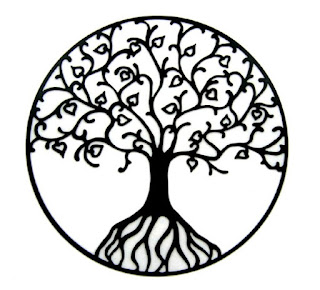A Sermon on Psalm 1 Preached on New Year’s Day 2017*
On New Year's Eve, someone stood up in the local pub and said,
“Let’s get ready! At the stroke of midnight, I want everyone to be standing
next to the one person who made their life worth living.”
As the clock struck midnight, the bartender was almost crushed to
death.[1]
--------------------------------------------
I don’t know how you spent your New Year’s Eve. I do know that we are spending this New Year’s Day standing next to Jesus, the one who gives us life and whose sacrifice on the cross gives us new life.
On a day when so many are making resolutions for the New
Year, it is fitting that today we are beginning our journey together through
the psalms. (Join us by following along here.)
· Psalm 1 serves as an introduction to the entire book of 150
psalms. Psalm 1 is encouraging a lifestyle of staying close to
God using the metaphor of a tree.
o We, like
trees, need water for our souls in order to live and not wither
o We, like
trees, stay planted by the source of that water – Jesus Christ
Psalm 1 encourages to have the goal of staying close to God,
and also gives us the process, the method for accomplishing that goal in verse
2: “Think about the law, God’s word, day
and night.”
"Relying
on God has to begin all over again every day
as if nothing had yet been done."
-CS Lewis
Think
About, Meditate (verse 2) – the Hebrew word is hagah – also translated as “growl.” Writer and pastor Eugene Peterson in his book titled “Eat
This Book: a conversation in the art of spiritual reading” points out that Isaiah 31:4 uses the same word to
describe the sound a lion makes eating his prey. Chewing and swallowing – “with low growls as
we taste and savor, anticipate and take in the sweet and spicy, mouth-watering,
soul-energizing morsel words.”
“O taste and see that the Lord is
good!” (Psalm 34:8)
How do we HAGAH this psalm? When we eat something, we have to break it
down into bite-sized pieces. We dig in
and pull it apart. We look more closely
at the pieces. So let’s look at the
pieces of this psalm by looking more closely at the words. Let’s digest this psalm together.
Read over the psalm here. Underline or circle words that strike
you.
·
What words did you circle and why?
o How does
that word add to the meaning of this psalm?
o What does
that word tell us about God?
What are some other ways we might taste and savor and digest
this psalm?
(Read aloud, Read morning and night, Discuss with someone, Write about it
Sing about it, Draw about it, Ask God about it - How else?)
I love the image given here of the tree. Someone who delights in God’s word and God’s ways is
like a tree.
If you were a tree, what kind would you be and why?
What characteristics of a tree are important, according to
the psalmist?
- · Planted – staying put
- · By streams of water – continual source of nourishment
- · Yielding in season – not constantly, but regularly
- · Not withering, prospering – healthy
We might be put off by the comparison in Psalm 1 between the
godly and the sinful. We know that we
are all sinners – all of us have fallen short of the glory of God. The difference is that through our faith in
Jesus we are sinners who have been forgiven,[3]
who have received God’s grace, who have put our toe in the water of salvation
by saying yes to Jesus, and who keep drawing from that life-giving water.
When Jesus meets the woman at the well and she asks him for
water, Jesus offers her instead living water, water that satisfies a deeper
thirst, the thirst in our souls (John 4:7-15).
This psalm encourages us to be like trees. Trees are planted with a long-term view. They don’t grow as quickly as other plants,
nor do they die as easily. They don’t
move around. They grow where they’re
planted.
·
Planted by streams of water – as we are planted in
Jesus Christ
o
Remain in me, and I will remain in you. For a branch cannot
produce fruit if it is severed from the vine, and you cannot be fruitful unless
you remain in me. --John 15:4
·
Yielding fruit – as we do through the work of the Holy
Spirit.
Psalm 1 is not telling us to avoid contact with sinners or
people who make fun of God, just don’t be moved by them from our place as trees
planted by the living water we have found in Jesus Christ.
We are, by the grace of God, firmly planted
in his love.
*At Westminster Presbyterian Church, Galveston Texas
[2] Eugene Peterson in “Eat This
Book” discusses the various uses of the word hagah and quotes Baron Friedrish von Hugel who compares meditative
reading to a dissolving lozenge. (Eerdmans, 2006)
[3] As Martin Luther put it, “simul Justus et peccator”, explained
nicely here: http://www.ligonier.org/blog/simul-justus-et-peccator/


No comments:
Post a Comment